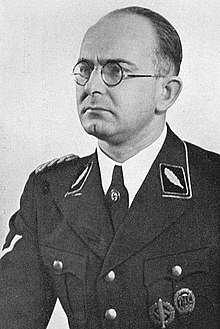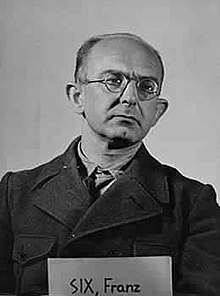Franz Six
Franz Alfred Six (12 August 1909 – 9 July 1975) was a Nazi official, promoter of the Holocaust and convicted war criminal. He was appointed by Reinhard Heydrich to head department Amt VII, Written Records of the Reichssicherheitshauptamt (RSHA). In 1940, he was appointed to direct state police operations in an occupied Great Britain following invasion.[1]
Franz Six | |
|---|---|
 Franz Six in 1940/1941 | |
| Born | 12 August 1909 Mannheim, Germany |
| Died | 9 July 1975 (aged 65) Bolzano, Italy |
| Allegiance | |
| Service/ | |
| Years of service | 1930–1945 |
| Rank | SS-Brigadeführer |
| Commands held | SS Division Das Reich c.1941 Einsatzgruppe B |
| Battles/wars | World War II |
In the post-war period, he worked as a public relations executive and a management consultant.
Academic career
Franz Six completed his classical high school in 1930, and proceeded to the University of Heidelberg to study journalism, sociology and politics. His late graduation was due to the fact he had to drop out of school from time to time to earn the money needed to graduate.[2] He graduated with a degree of doctor in philosophy in 1934. In 1936, Six earned the high degree of doctor, and became a professor of journalism at the University of Königsberg where he also took up the position of press director for the German Student's Association.[3] By 1939, he had become chair for Foreign Political Science at the University of Berlin and was its first dean of the faculty for foreign countries.
Nazi official
Six joined the Nazi Party in 1930 with member number 245,670 and the Sturmabteilung (SA) in 1932, for whom he was a student organizer. Six joined the Sicherheitsdienst (SD) in 1935 and his SS membership number was 107,480.[4] Impressed by his academic achievements and outstanding curriculum, Reinhard Heydrich appointed him as head of Amt VII, Written Records of the RSHA which dealt mainly with ideological tasks. These included the creation of anti-semitic, anti-masonic propaganda, the sounding of public opinion and monitoring of Nazi indoctrination by the public. He held this post until 1943 when he was succeeded by Paul Dittel.[5]
On 17 September 1940, the same day on which Hitler indefinitely postponed the idea of an invasion of Great Britain, Heydrich charged Six to plan the elimination of anti-Nazi elements in Britain following a successful invasion by the Wehrmacht. Six was intended to become the SD-Commander in the country, with his headquarters to be in located in London, and with regional task forces in Birmingham, Liverpool, Manchester, and Edinburgh.[6] His immediate mission would have been to hunt down and arrest some 2,820 people listed in the Sonderfahndungsliste G.B. ("Special Search List Great Britain"). This document, which post-war became known as "The Black Book", was a secret list previously compiled by Walter Schellenberg, Chief of Amt VI, Ausland-SD, that made up the foreign intelligence branch of the SD. The list contained the names of prominent British residents to be arrested immediately after a successful invasion.[1] Some people on the list included British politicians, such as Winston Churchill and other members of the Cabinet, writers like Sigmund Freud (even though he had died in September 1939), the philosopher Bertrand Russell, members of exiled governments, financiers such as Bernard Baruch and many other anti-Nazi elements. A separate list also named many organizations which would have to be dismantled as well, namely the Freemasons, the Jehovah's Witnesses and even the Boy Scouts. Six would also have been responsible for handling the over 300,000 large population of British Jews.[1]
Einsatzgruppen

After Hitler gave up on his attempts to invade Great Britain and Six's planned role never being realized, Six was on 20 June 1941 assigned as chief of Vorkommando Moscow, a unit of Einsatzgruppe B in the Soviet Union. During this command, Six's Kommando reported "liquidating" 144 persons. The report claimed "The Vorkommando Moscow was forced to execute another 46 persons, amongst them 38 intellectual Jews who had tried to create unrest and discontent in the newly established Ghetto of Smolensk." He was promoted by Heinrich Himmler on 9 November 1941 to SS-Oberführer for exceptional service in the Einsatz. On 31 January 1945, he was again promoted to SS-Brigadeführer.
After the war Six was tried as a war criminal in the Einsatzgruppen Trial at Nuremberg in the of 1948. Unable to link him directly to any atrocities, the Nuremberg tribunal sentenced him to 20 years' imprisonment. A clemency court commuted this sentence to 10 years, and he was released on 30 September 1952. He served about 7.5 years from his arrest to his release- about 13.5 days for each of his 200 victims. CIA files suggest Six joined the Gehlen Organization, the forerunner to the Bundesnachrichtendienst, in the 1950s.[7]
Later years
Franz Six retired to Friedrichshafen in southern Germany. He worked as a publicity/advertising executive for Porsche.[8]
Six was called as one of four witnesses by defense attorney Robert Servatius in the 1961 trial in Israel of Adolf Eichmann, and gave his testimony by deposition in West Germany. Servatius had wanted to have Six appear in person, but Prosecutor Gideon Hausner stated that the former Nazi general would be subject to arrest as a war criminal.[9] Six's testimony was introduced in Eichmann's defense, but proved to be of more help to the prosecution.[10]
Franz Six died in 1975.
References
- Shirer, William L. (1960). The Rise and Fall of the Third Reich. Simon and Schuster, New York.
- Lampe, David & Sheffield, Gary, The Last Ditch: Britain's Secret Resistance and the Nazi Invasion Plan, MBI Publishing Company, 2007, p. 21.
- Müller-Hill, Benno, 'The Idea of the Final Solution and the Role of Experts', in Cesarani, David, The Final Solution: Origins and Implementation, Routledge, 1994, p. 67.
- Biondi, Robert, ed., SS Officers List: SS-Standartenführer to SS-Oberstgruppenführer (As of 30 January 1942), Schiffer Publishing, 2000, p. 26.
- Dittel biography
- Rich, Norman (1974). Hitler's War Aims vol. II, p. 397
- Historical Analysis of 20 Name Files from CIA Records By Dr. Richard Breitman, Professor of History, American University, IWG Director of Historical Research, April, 2001. Retrieved Feb 19, 2010.
- Müller-Hill, Benno. "The Idea of the Final Solution and the Role of Experts." In David Cesarani, ed. The Final Solution: Origins and Implementation, 62-72. New York: Routledge, 1996.
- "Telling Points Are Scored in Adolf Eichmann Trial," Bridgeport Sunday Post, 7 May 1961, pD-10
- "Eichmann Admits He Knew Some Jews Going to Deaths," Abilene Reporter-News, 12 July 1961, p.14-A